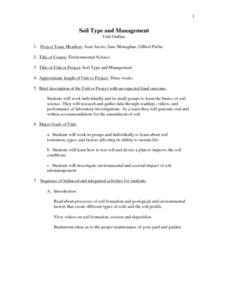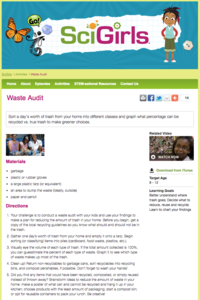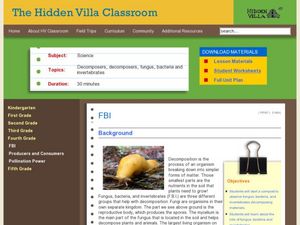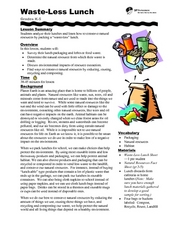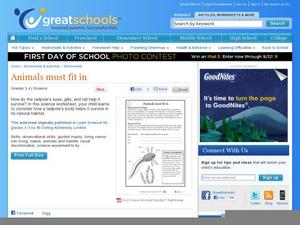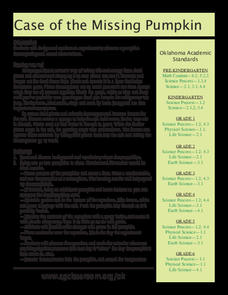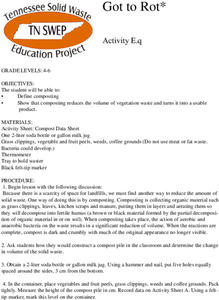Curated OER
Composting Leftovers
In this composting leftovers worksheet, students set up an experiment with food waste and soil, observing and recording the differences for two weeks.
Curated OER
Organic Farming / Agriculture
Want an organic farming resource packed with experiments, background information, science fair projects, and topics of interest for further research? Here it is. Young environmental scientists can explore concepts involved in organic...
Curated OER
To Rot or Not!
Students discover that composting helps reduce landfill waste and is good for the soil. They explore the techniques of composting through a variety of media, art activities and hands-on experience.
Curated OER
Garbage in the Garden
Learners create their own compost. In this soil lesson, students fill a bag with waste and soil, in order to create a mini compost bin. Learners observe the baggies over a 6 week period, they record their findings and collect data...
Curated OER
Organic Matter
Written for an agriculture curriculum, this presentation on organic matter is also informative for gardening or horticulture classes. It details the chemical makeup, affecting factors, functions, maintenance, and composting to create a...
Curated OER
Organic and Inorganic Waste
Students conduct a scientific investigation about organic or inorganic waste. In this organic or inorganic waste lesson, students create a compost heap to determine the difference between inorganic and organic waste. Students...
Curated OER
Soil Type and Management
Students study the basics of soil science. They research and gather data through readings, videos, and performance of laboratory investigations. As a team they generate oral and written recommendations for the amendment of soil.
PBS
Waste Audit
Does everything in the trash can belong there? Conduct a waste audit with your class by collecting a day's worth of garbage, separating it into recyclables, non-recyclables, or food waste, and properly distributing what they find into...
Purdue University
Food Waste Solutions
Easy doesn't always mean better. In an era with pre-packaged everything, learners consider the environmental impact of the convenient trend. They critique the packaging of food and how waste impacts cost and then look for solutions.
Curated OER
Recycling
In this recycling worksheet, students sort a list of items as either trash or something that can be reused, recycled, or used in composting. This worksheet has 5 fill in the blanks in a chart.
Curated OER
De"compost"ition
Students develop an understanding of the decomposition process and the parameters which influence the rate at which it occurs.
Curated OER
FBI
Fourth graders experiment with compost. In this Science lesson, 4th graders begin a worm compost as well as an outdoor compost. Students discuss decomposition.
SF Environment
Waste-Less Lunch
Is it possible to have a waste-less lunch? Can your class become leaders in conservation? Discuss the importance of reducing waste during lunch time with a fun lesson plan that can be extended to everyday practices. First the class...
Nuffield Foundation
Microbes Ate My Homework
Now you have a new excuse not to do your homework. A long-term experiment has learners explore cellulose-digesting enzymes. They simulate how paper breaks down in a compost bin. There's no need to blame your dog for eating your homework...
Curated OER
Dinnertime for Animals
Is a deer an herbivore? What about a spider? Experiment with the food chain in an interactive science experiment. After listing the herbivores from a selection of animals, third and fourth graders compare the skulls and teeth of...
Curated OER
Animals Must Fit In
A instructional activity on tadpoles is here for your young biologists. Learners read a short paragraph on tadpoles, then answer three questions regarding how parts of their bodies help the tadpole to survive in the pond. There is a good...
Curated OER
Recyclers to the Rescue
Producers, consumers, food chains, and plants are the stars of this science lesson. Learners take part in an inquiry which helps them to discover the most effective and efficient way to grow a producer. They have a variety of containers...
Curated OER
Case of the Missing Pumpkin
Scientists define and discuss decomposition, and watch pumpkins decompose and return to soil in classroom experiment. They record the date the experiment began, chart changes in pumpkins on a calendar, count how many days it takes...
Curated OER
It's Just Dirt
Young scholars discover how seed germination varies according to the soil type. In this soil science lesson, students discuss what plants need in order to grow and investigate various types of soil. Young scholars use their senses to...
Cornell University
Fibers, Dyes, and the Environment
Nanofibers can be made through electrospinning or force spinning in order to reduce the negative impact on the environment. Pupils study the role of fibers and dye on the environment through a series of five hands-on activities. Then,...
Curated OER
Vermiculture Food Waste Compost Program for Touchstone School
Students explore the advantages of composting. In this recycling lesson students complete a worm compost project and collect food waste to feed them.
Curated OER
Nature's Recycling Program
Learners identify what materials make up compost. In this science of recycling lesson, students explain the benefits of composting determine how compost is a good plant fertilizer.
Curated OER
Worms! Nature's Recyclers
Third graders explore the process of composting. In this composting lesson, 3rd graders read the book Wonderful Worms, and create composters.
Curated OER
Got to Rot
Students make their own compost in a 2-liter jug and determine the actual volume loss in the composted material over a six-month period.








